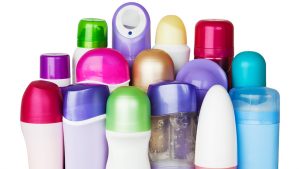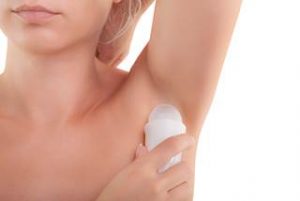
Applying antiperspirants/Deodorants every morning is a part of our daily routine as is brushing our teeth. But should we be paying closer attention to what it is that we are applying under our arms and could it be damaging our health?
Many studies have taken place in recent years on deodorants and antiperspirants and their connection with breast cancer.
The aluminum in these products stops you from sweating and blocks up your pores.
According to recent studies, most breast cancers develop in the upper outer part of the breast, the area closest to the armpit, which is where antiperspirants are applied. Could this be coincidence? The studies suggest that chemicals in antiperspirants, including aluminum and parabens are absorbed into the skin. These studies claim that those chemicals may then interact with DNA and lead to cancerous changes in cells, or interfere with the female hormone estrogen, which is known to influence the growth of breast cancer cells.

Because estrogen has the ability to promote the growth of breast cancer cells, some scientists have suggested that the aluminum-based compounds in antiperspirants may contribute to the development of breast cancer. However, research is still on going.
Here are some facts… In a 2007 study published in the Journal of Inorganic Biochemistry, researchers tested breast samples from 17 breast-cancer patients who had undergone mastectomies. The women who used antiperspirants had deposits of aluminum in their outer breast tissue. Concentrations of aluminum were higher in the tissue closest to the underarm than in the central breast.
Below we have listed the most harmful chemicals found in most common Deodorants. These are the ones to avoid.
- Aluminium (Aluminium Zirconium, Aluminium Chlorohydrate, Aluminium tetrachlorohydrex)
Aluminium acts a plug to stop us from sweating. This ingredient causes an imbalance with our hormones and can be a factor in the cause of breast cancer.
- Parabens
Butylparaben, Heptylparaben, Ethylparaben, Propylparaben, Methylparaben. All of these should be avoided as they mimic the hormone estrogen. Look out for products with Paraben free Labels.
- Propylene Glycol
This is petroleum based. Studies have shown that it can cause damage to the central nervous system, liver and heart.
- Triclosan
Triclosan is classified as a pesticide by the FDA. It is also classed as a probable carcinogen.
Even though research is ongoing and no formal research has been published about the dangers of using aluminium based antiperspirants, we at mother nurture have looked at products that do not contain these possible carcinogenic ingredients. And while you may have to reapply some more often, the natural ingredients and aluminum-free formulas will give you peace of mind that you’re avoiding some of the chemicals found in more conventional antiperspirants.
There are many natural alternatives out there but a few tried and tested are listed below. Cut out these toxic ingredients now before they are officially banned from our cosmetics. Give your body the break it deserves.
Green people natural Deodorants https://www.greenpeople.co.uk
Pitrok Crystal – leaves you smelling fresh all day! https://www.pitrok.co.uk
Salt of the Earth natural deodorant https://crystalspring.co.uk
Jason natural deodorant stick. https://www.jasonnaturalcare.co.uk